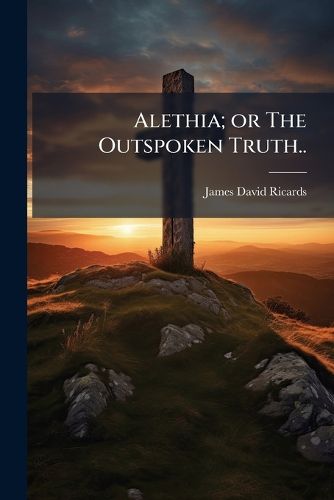Readings Newsletter
Become a Readings Member to make your shopping experience even easier.
Sign in or sign up for free!
You’re not far away from qualifying for FREE standard shipping within Australia
You’ve qualified for FREE standard shipping within Australia
The cart is loading…






Alethia; or The Outspoken Truth, penned by James David Ricards, offers a compelling exploration of religious themes and ethical considerations within a Christian framework. Published in 1885, this book provides insights into the theological discourse of the late 19th century. Ricards delves into the 'outspoken truth, ' presenting a perspective rooted in his understanding of Christian doctrine and its practical implications for daily life.
The book's historical context enhances its value, providing readers with a glimpse into the religious and intellectual climate of the time. Scholars and enthusiasts of religious history will find Ricards' work a valuable resource, shedding light on the enduring questions of faith, ethics, and truth. The book resonates with relevance for those interested in the interplay between religious belief and moral action.
This work has been selected by scholars as being culturally important, and is part of the knowledge base of civilization as we know it. This work was reproduced from the original artifact, and remains as true to the original work as possible. Therefore, you will see the original copyright references, library stamps (as most of these works have been housed in our most important libraries around the world), and other notations in the work.
This work is in the public domain in the United States of America, and possibly other nations. Within the United States, you may freely copy and distribute this work, as no entity (individual or corporate) has a copyright on the body of the work.
As a reproduction of a historical artifact, this work may contain missing or blurred pages, poor pictures, errant marks, etc. Scholars believe, and we concur, that this work is important enough to be preserved, reproduced, and made generally available to the public. We appreciate your support of the preservation process, and thank you for being an important part of keeping this knowledge alive and relevant.
$9.00 standard shipping within Australia
FREE standard shipping within Australia for orders over $100.00
Express & International shipping calculated at checkout
Alethia; or The Outspoken Truth, penned by James David Ricards, offers a compelling exploration of religious themes and ethical considerations within a Christian framework. Published in 1885, this book provides insights into the theological discourse of the late 19th century. Ricards delves into the 'outspoken truth, ' presenting a perspective rooted in his understanding of Christian doctrine and its practical implications for daily life.
The book's historical context enhances its value, providing readers with a glimpse into the religious and intellectual climate of the time. Scholars and enthusiasts of religious history will find Ricards' work a valuable resource, shedding light on the enduring questions of faith, ethics, and truth. The book resonates with relevance for those interested in the interplay between religious belief and moral action.
This work has been selected by scholars as being culturally important, and is part of the knowledge base of civilization as we know it. This work was reproduced from the original artifact, and remains as true to the original work as possible. Therefore, you will see the original copyright references, library stamps (as most of these works have been housed in our most important libraries around the world), and other notations in the work.
This work is in the public domain in the United States of America, and possibly other nations. Within the United States, you may freely copy and distribute this work, as no entity (individual or corporate) has a copyright on the body of the work.
As a reproduction of a historical artifact, this work may contain missing or blurred pages, poor pictures, errant marks, etc. Scholars believe, and we concur, that this work is important enough to be preserved, reproduced, and made generally available to the public. We appreciate your support of the preservation process, and thank you for being an important part of keeping this knowledge alive and relevant.